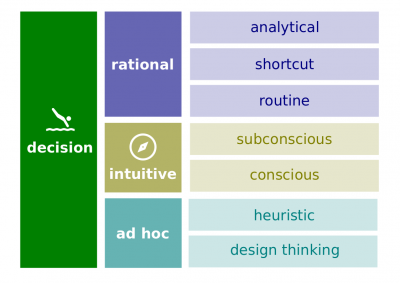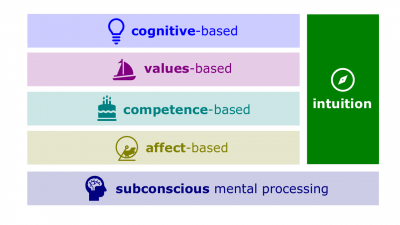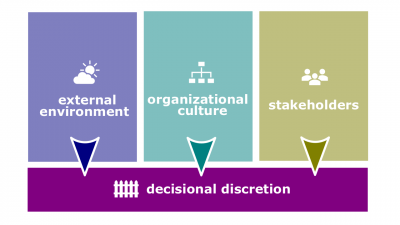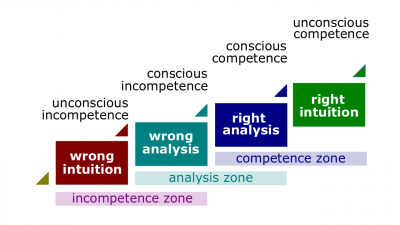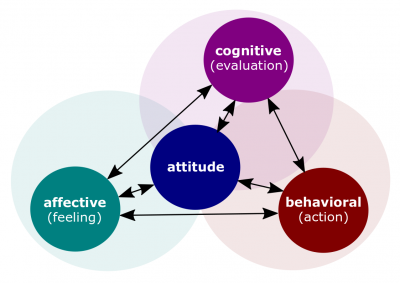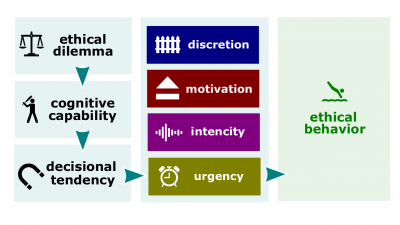Decision-making
Revision as of 18:06, 14 June 2020 by Gary (talk | contribs) (Created page with "Decision-making (alternatively spelled, decision making) is the action or process of making decisions, especially, creative behavior resulted in a non-progra...")
Decision-making (alternatively spelled, decision making) is the action or process of making decisions, especially, creative behavior resulted in a non-programmed decision.
Classifications
Programmed vs non-programmed
- Decision. A choice made from among two or more alternatives.
- Programmed decision. Any decision that is made while handling a structured task. These decisions are repetitive and can be handled by a routine approach. In enterprises, programmed decisions are often made according to policies, operative rules, etc.
- Non-programmed decision (creative decision). A unique and nonrecurring decision that requires a custom-made solution.
Individual vs collective
- Individual decision-making. Decision-making made by an individual as opposed to group decision-making.
- Decision-making approach. A particular manner of taking preliminary steps toward making a decision.
- Intuitive decision-making. Unconscious decision-making on the basis of distilled experience, feelings, and accumulated judgment.
- Intuition. An instinctive feeling not necessarily supported by research.
- Rational decision-making. Decision-making that produces choices that are logical and consistent and maximize value.
- Rationale. A reasoning characterized by making consistent, value-maximizing choices within specified constraints.
- Decision criteria. Criteria that define what's important or relevant to resolving a problem.
- Quantitative approach in management. The use of quantitative techniques to improve decision-making.
- Decisional discretion. The freedom to decide what should be done in a particular situation.
- Structured-task competence. A model that describes psychological states involved in the process of progressing from incompetence to analytical competence and, further, to intuitive competence in some knowledge, skill, and/or ability.
- Unconscious incompetence (or wrong intuition). A situation in which the individual neither understands nor knows how to accomplish a task and does not necessarily recognize the deficit.
- Conscious incompetence (or wrong analysis). A situation in which the individual neither understands or knows how to accomplish a task, but he or she recognizes the deficit. He or she also realizes the value of new knowledge, skill, and/or ability needed in addressing the deficit. The making of mistakes can be integral to the learning process at this level of competence.
- Conscious competence (or right analysis). A situation in which the individual understands and/or knows how to accomplish a task. However, demonstrating the knowledge, skill, and/or ability requires concentration. It may be broken down into steps, and there is heavy conscious involvement in executing the needed knowledge, skill, and/or ability.
- Unconscious competence (or right intuition). A situation in which the individual not only understands and knows how to accomplish a task, but has had so much practice with a skill that it has become "second nature" and can be performed easily. As a result, the skill can sometimes be performed while executing another task. The individual may be able to teach it to others, depending upon how and when it was learned.
- Behavior. The way in which someone, something, or their group functions, operates, and/or conducts oneself.
- Intention. A decision to act in a given way.
- Behaviorism. A theory that argues that behavior follows stimuli in a relatively unthinking manner.
- Creative behavior. The way in which someone, something, or their group makes non-programmed decisions and acts on them.
- Attitude. An evaluative statement or judgment, either favorable or unfavorable, concerning objects, people, or events.
- Cognitive component. That part of an attitude that's made up of the beliefs, opinions, knowledge, or information held by a person. In other words, the cognitive component is the opinion or belief segment of an attitude.
- Affective component. The emotional or feeling segment of an attitude.
- Behavioral component. The segment of an attitude that refers to an intention to behave in a certain way toward someone or something.
- Controlled expectancy. A situation in which a decision maker is able to estimate the likelihood of certain outcomes.
- Certainty. A situation in which a decision maker can make accurate decisions because all outcomes are known.
- Uncertainty. A situation in which a decision maker has neither certainty nor reasonable probability estimates available.
- Ad hoc decision-making.
- Design thinking. Approaching management problems as designers approach design problems.
- Heuristic. A rule of thumb that decision makers use to simplify decision-making.
- Core self-evaluation. Bottom-line conclusions individuals have about their capacities, competence, and worth as a person. In other words, self-believing in one's inner worth and basic competence.
- General mental ability. An overall factor of intelligence, as suggested by the positive correlations among specific intellectual ability dimensions.
- Decisional tendency.
- Bounded rationality. Decision-making that is rational, but limited (bounded) by an individual's ability to process information. In other words, bounded rationality is a process of making decisions by constructing simplified models that extract the essential features from problems without capturing all their complexity.
- Escalation of commitment. An increased commitment to a previous decision despite evidence it may have been wrong.
- Risk aversion. The tendency to prefer a sure gain of a moderate amount over a riskier outcome, even if the riskier outcome might have a higher expected payoff.
- Decision-making dilemma. Optimizing vs. satisficing, intuitive vs rational vs ad hoc, Agile vs rigid, conservative vs aggressive, linear vs nonlinear
- Satisfice. Acceptance of solutions that are "good enough."
- Allostasis. Working to change behavior and attitude to find stability.
- Self-regulation strategy.
- Prevention focus. A self-regulation strategy that involves striving for goals by fulfilling duties and obligations.
- Promotion focus. A self-regulation strategy that involves striving for goals through advancement and accomplishment.
- Ethical dilemma. A situation in which individuals are required to define right and wrong conduct.
- Ethics. Principles, values, and beliefs that define what is right and wrong behavior.
- Behavioral ethics. Analyzing how people actually behave when confronted with ethical dilemmas.
